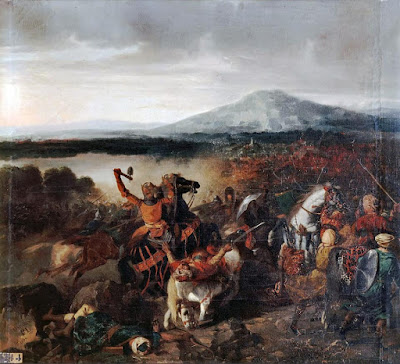June 22, 1101 Marks the death of Ruggero d'Altavilla (Roger de Hauteville), Grand Count of Sicily.Dextera Domini fecit virtutem. Dextera Domini exaltavit me. (The right hand of God gave me courage. The right hand of God raised me up) – The inscription on Roger's shield following his victory at Cerami (Quoted from The Normans in Sicily by John Julius Norwich)
Ruggero I di Sicilia
The Norman arrival in Southern Italy began in the eleventh century. According to tradition, in 1016 a group of pilgrims drove away a band of Moslem raiders plaguing the Lombard Principality of Salerno. Grateful and impressed with the Normans' martial prowess the Lombards invited them to stay. Word quickly spread through the halls of Normandy about the opportunities for soldiers-of-fortune and it wasn't long before the rival lords of Southern Italy were employing Norman freebooters in their wars.
 Led by the Altavilla (Hauteville) clan, Norman expansion was steady. Under Guglielmo Braccio di Ferro (William "Iron Arm") they established themselves at Melfi. In 1046 William's half-brother Roberto il Guiscardo (Robert the cunning) joined in the conquest. The renowned condottiere wrenched Apulia and Calabria from Byzantium and was granted the title of Duke by Pope Nicholas II.
Led by the Altavilla (Hauteville) clan, Norman expansion was steady. Under Guglielmo Braccio di Ferro (William "Iron Arm") they established themselves at Melfi. In 1046 William's half-brother Roberto il Guiscardo (Robert the cunning) joined in the conquest. The renowned condottiere wrenched Apulia and Calabria from Byzantium and was granted the title of Duke by Pope Nicholas II.Following in his brothers' footsteps the youngest Altavilla, Ruggero (Roger), arrived in Southern Italy in 1055. Looking for fortune and adventure he was to gain great fame for expelling the Moslems from Sicily.
His chronicler Goffredo Malaterra writes:
"While he was staying at Reggio with his brother the duke, that most distinguished young man Count Roger of Calabria heard that Sicily was in the hands of the unbelievers. Seeing it from close hand, with only a short stretch of sea laying between, he was seized by the desire to capture it, for he was always eager for conquest." (Quoted from The Age of Robert Guiscard by G.A. Loud)
 |
Roger I of Sicily at the Battle of Cerami in 1063 by Prosper Lafaye
|
 |
| Ruggiero II il Normanno |
By January 1071 Palermo capitulated; Syracuse yielded in March 1086; and in February 1091 Noto was captured. In just 30 years the Moslem dominion of Sicily was finally broken.
On June 22, 1101, in the small Calabrian town of Mileto, the Great Count of Sicily died. His third wife, Countess Adelaide, ruled as Regent until their son's Coronation. On Christmas Day, 1130, Ruggero II [pictured right], was proclaimed King of Sicily, which included mainland Southern Italy.
~ Giovanni di Napoli, June 20th, Feast of San Silverio
Also see: The Seeds of the Kingdom










